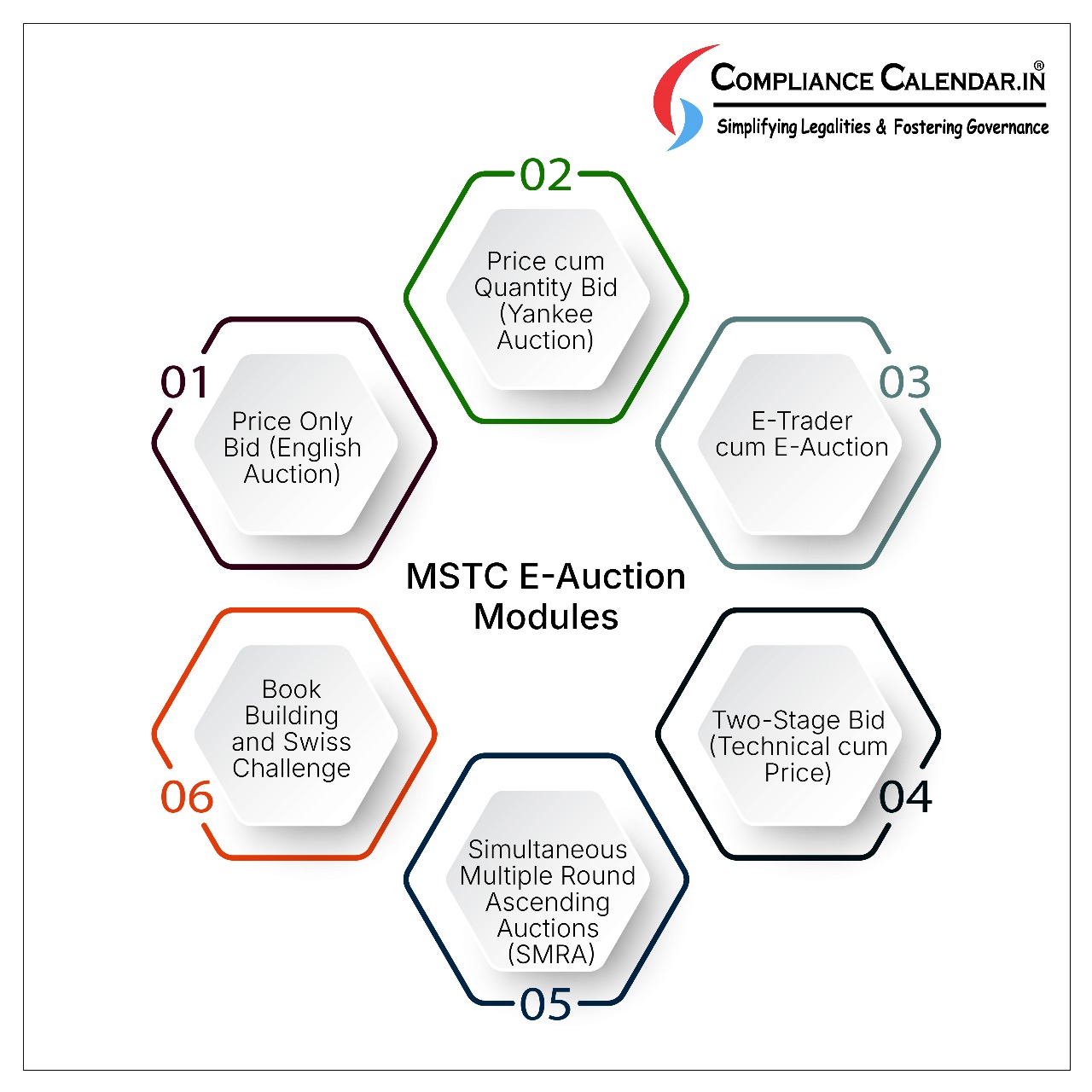The MSTC E-waste Auction Process in India plays an important role in managing electronic waste in an environmentally sound and economically efficient manner. Electronic waste or e-waste includes discarded electrical or electronic devices such as laptops, mobile phones, televisions, refrigerators, and more. With the increase in technology usage, e-waste is also increasing at an alarming rate. To manage and dispose of this waste effectively, the Government of India has introduced several measures. One such effective platform is MSTC Limited, which facilitates the e-waste auction process.
What is MSTC Limited?
MSTC Limited, originally known as Metal Scrap Trade Corporation Limited, is a Government of India enterprise under the Ministry of Steel. It is a Miniratna Category-I Public Sector Undertaking (PSU), with the government holding a majority stake of 64.75%. Over the years, MSTC has evolved from being just a metal scrap trading company into a diversified e-commerce and auction platform, serving both the public and private sectors.
Established under the Companies Act, 1956, MSTC has now become a leader in e-auction services across India. MSTC's e-commerce portal provides a transparent, secure, and fair online bidding environment. One of the key areas it covers is the MSTC E-waste Auction, which helps recyclers and companies access discarded electronics through a legal and traceable auction system.
Importance of MSTC E-Waste Auction Process in India
The MSTC E-waste Auction Process is not just a method for selling old or unused electronic items. It is part of India's broader environmental strategy to manage e-waste responsibly. Through this auction process, registered recyclers, manufacturers, and dismantlers can acquire e-waste in a legitimate and eco-friendly way. This reduces the burden on landfills and supports the circular economy.
E-waste contains both harmful materials and valuable metals. If disposed of improperly, it can damage the environment. The MSTC E-waste Auction ensures that only authorized entities handle e-waste, making the process safe and regulated.
MSTC E-Waste Auction: Key Product Categories
The MSTC E-waste Auction includes a wide range of products and materials. These include:
-
Waste Electrical and Electronic Equipment (WEEE)
-
Coal, petcock, and lignite
-
Agricultural and horticultural produce
-
Confiscated goods from customs
-
Scrap and surplus items from PSUs and government bodies
-
Minerals such as iron ore, chrome ore, and manganese ore
-
Coal mine blocks
-
Forest products like timber, sandalwood, red sandal, and tendu leaves
-
Moveable and immovable assets
Each auction is category-specific, and participants must meet the eligibility criteria to bid on specific items.
MSTC E-Auction Modules
The MSTC E-waste Auction Process uses different types of auction modules to cater to various industries and requirements. These modules include:

Price Only Bid (English Auction)
This is a traditional auction format where participants place progressively higher bids for a specific item or lot. The bidding continues until no higher bids are placed, and the highest bidder wins. It's a transparent and competitive model widely used for e-waste and scrap material auctions.
Price cum Quantity Bid (Yankee Auction)
In this format, bidders quote both the price they are willing to pay and the quantity they want to purchase. The system allocates quantities starting from the highest bidder downwards until the entire lot is distributed. It allows bulk buyers to secure a portion of the total available material.
E-Trader cum E-Auction
This model integrates online trading with auction bidding, enabling sellers to list lots for fixed price trading and also conduct competitive bidding. It allows flexibility for both fixed-price buyers and auction participants. This hybrid approach increases visibility and sale chances.
Two-Stage Bid (Technical cum Price)
This method involves two rounds. First, bidders must qualify based on technical criteria such as credentials or equipment capabilities. Only those who pass the technical evaluation can enter the financial bidding round. It is used where quality and compliance are important, along with price.
Simultaneous Multiple Round Ascending Auctions (SMRA)
SMRA is used when multiple lots are auctioned at the same time. Bidders can place bids on more than one lot in multiple rounds. Prices rise gradually in each round, and the process continues until no higher bids are placed. It is ideal for selling similar or related assets across categories.
Book Building and Swiss Challenge
These are advanced bidding models commonly used in government asset monetization or public-private partnership (PPP) projects. In book building, bids are collected to discover the best price. In the Swiss Challenge, an initial bid is published and others can offer better terms, giving the first bidder a chance to match.
Who Can Participate in MSTC E-Waste Auction?
Only authorized entities are allowed to participate in the MSTC E-waste Auction Process. These include:
-
Authorized recyclers registered with the Central or State Pollution Control Board
-
Manufacturing companies
-
Importers and Brand Owners (PIBOs)
-
Dismantlers and waste processing firms
-
Government institutions and educational bodies
This restriction ensures that only those who are capable of handling e-waste responsibly are part of the auction process.
MSTC E-Waste Auction Registration Process for 2025
To participate in MSTC e-auctions, registration on the MSTC portal is mandatory. Below is a detailed step-by-step process for registering:
Step 1: Visit MSTC’s E-Commerce Portal
Visit the official MSTC e-commerce portal at https://www.mstcecommerce.com. From the homepage, click on the "e-Auction" option in the main menu. Select the appropriate auction category, such as e-waste.
Step 2: Register as a Buyer
Choose your region – Northern, Southern, Eastern, or Western. Then, select the option for "Buyer Registration." You will be directed to the registration form.
Step 3: Fill the Online Form
Fill in all required details accurately, such as:
-
Name of the company or individual
-
PAN and GSTIN numbers
-
Mobile number and email address
-
Address and contact person details
-
Type of registration (recycler, dismantler, etc.)
Step 4: Upload Required Documents
The following documents must be uploaded in PDF or JPEG format (less than 1MB each):
-
PAN Card
-
Aadhaar, Voter ID, or Ration Card
-
GST Registration Certificate
-
Authorization Letter from your organization
-
Bank details and a canceled cheque
-
Copy of registration/authorization from PCB
Step 5: Submit and Await Approval
After submitting the form, MSTC will verify your details. An acknowledgment email is sent, and approval usually takes 2–3 business days. Upon approval, login credentials are provided to the registered email.
MSTC E-Waste Auction Bidding Process
Once registered and approved, participants can begin bidding on auctions. The process involves the following steps:
-
Login: Use your MSTC credentials to log in to your buyer dashboard.
-
Browse Upcoming Auctions: View the list of upcoming events, filter by category, location, or product type.
-
Download Auction Catalog: This document provides item lists, inspection dates, reserve prices, and auction timings.
-
EMD Payment: Pay the required Earnest Money Deposit via NEFT or RTGS to be eligible for bidding.
-
Bid Live: During the auction window, place your bids using the “Live Auction” feature.
-
Win and Pay: If you are the highest bidder, MSTC sends a confirmation email and payment details. Pay the balance within the stipulated time.
-
Take Delivery: After payment, the disposal site will inform you of the pickup schedule. You must remove the items within 3–5 days.
Important Guidelines to Follow in MSTC E-Waste Auctions
There are specific rules to be followed during the MSTC E-waste Auction:
-
All bidders must be technically qualified and authorized by CPCB or SPCB.
-
Bids must be submitted in a sealed format – both technical and financial proposals.
-
Technical proposals should include EMD and relevant documents.
-
Financial proposals must include the bidder's quote and financial capacity.
-
Any uncertainties or ambiguities in offers are not entertained.
-
The CPCB can withdraw items from the auction by stating valid reasons.
-
If a successful bidder fails to collect the items in time, the entire bid amount is forfeited.
-
In case of disputes, the decision of the CPCB Chairman is final.
Documents Required for MSTC E-Waste Auction Bid
To submit a valid bid, participants must prepare the following documents:
-
PAN Card (self-attested)
-
Address Proof (Aadhaar, Voter ID, or Ration Card)
-
Valid CPCB/SPCB registration and authorization certificate
-
Bank account details and canceled cheque
-
Demand Draft or proof of EMD payment
These documents are essential to qualify for bidding and ensure the legitimacy of participants.
Benefits of MSTC E-Waste Auction
Participating in the MSTC E-waste Auction offers several benefits:
Transparent Process
The entire auction process is digitally recorded and open for participants to view. This ensures fairness and eliminates the chances of manipulation. Bidders can track bids in real-time, making the system trustworthy and credible.
No Middlemen
MSTC’s platform allows direct interaction between buyers and government or authorized sellers. This eliminates the involvement of agents or intermediaries. As a result, buyers get authentic materials straight from the source.
Lower Costs
Buyers can often acquire e-waste and scrap materials at rates lower than market vendors. Auctions encourage competitive pricing, allowing participants to get value-for-money deals. This makes the platform cost-effective for bulk purchases.
Secure Platform
The MSTC auction portal is maintained under strict government oversight and follows regulatory standards. Transactions are encrypted and securely processed, reducing risks of fraud or data breaches. This gives users confidence in online bidding.
Wide Access
The platform connects buyers to multiple auctions across various government departments, sectors, and states. It provides a centralized system where users can explore diverse opportunities from different locations, all in one place.
Conclusion
The MSTC E-waste Auction Process in 2025 continues to revolutionize how India manages its electronic waste. By creating a secure and efficient online platform, MSTC enables recyclers, traders, and manufacturers to legally acquire electronic waste for recycling and reuse. It helps build a sustainable and circular economy while ensuring compliance with environmental regulations. Registration is easy, the process is transparent, and the rewards are significant for businesses willing to adopt eco-friendly practices. For anyone interested in the recycling business or surplus procurement, the MSTC E-waste Auction is a reliable gateway to success.























_crop10_thumb.jpg)
_crop10_thumb.jpg)



_crop10_thumb.jpg)








_crop10_thumb.jpg)























2018_learn_crop10_thumb.jpg)



